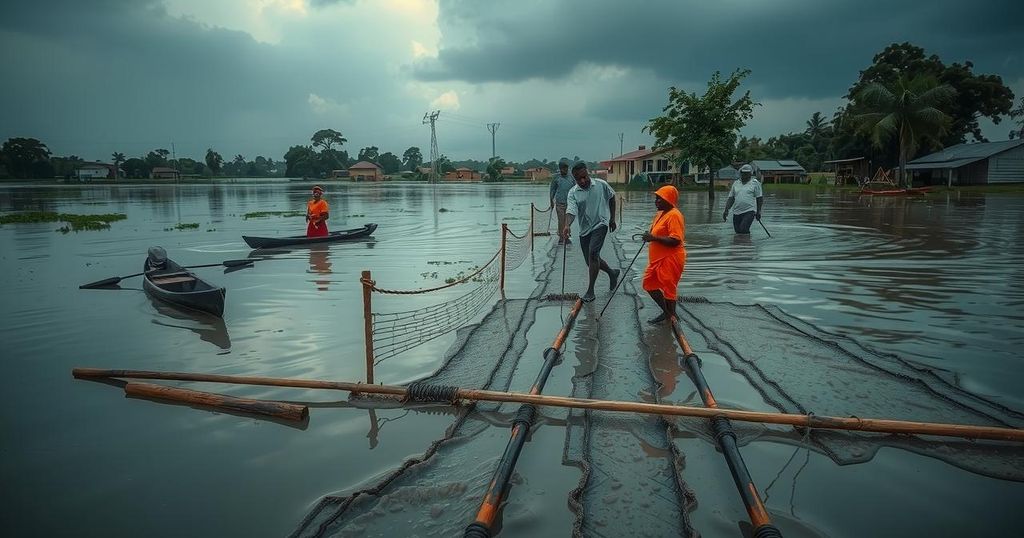Severe flooding in South Sudan has displaced over 226,000 individuals, impacting 42 counties and jeopardizing access to health services. The situation is aggravated by rising malaria and suspected cholera cases, prompting the WHO to respond with emergency health kits and support for vulnerable communities. Climate change is noted as a significant factor in the intensifying floods, calling for sustainable measures to improve health system resilience.
October 21, 2024 (JUBA) – South Sudan is experiencing unprecedented flooding, resulting in significant devastation across multiple regions. As reported, over 226,000 individuals have been displaced, with extensive damage to homes, livelihoods, and critical infrastructure, including roads. According to the United Nations, flooding has impacted 42 out of 78 counties within South Sudan. Additionally, fifty-eight healthcare facilities have been submerged, while nearly ninety others are rendered inaccessible. Approximately fifteen major roadways, including those leading to the capital, Juba, have been severed, hampering access to essential health services. As of October 4, 2024, it has been estimated that around 890,000 residents in flood-affected areas have been adversely impacted. The intensification of flooding, typically triggered by heavy rains during the annual rainy season from April to November, has been exacerbated by climate change, further limiting communities’ capacity to respond and in some instances resulting in permanent displacement. According to the World Health Organization (WHO), these floods have worsened an already critical humanitarian crisis in South Sudan, where nearly 800,000 refugees and returnees have fled armed conflicts in neighboring Sudan. Furthermore, two suspected cholera cases have emerged in Renk County within the Upper Nile State, which is a primary entry point for 60% of incoming refugees and returnees. Malaria cases are also rising, with more than 120,000 reported cases and 31 suspected fatalities by the end of September. “People are in a heightened state of vulnerability due to multiple shocks. WHO is committed to work with the Ministry of Health and our partners to ensure that they have access to essential health services continue while also prioritizing the response to growing humanitarian and health needs,” stated Dr. Humphrey Karamagi, the WHO Representative in South Sudan. In response to the crisis, the WHO has distributed approximately 88 metric tonnes of emergency health kits to various affected regions including Renk, Bentiu, Malakal, and Bor counties. These kits are designed to support over 870,000 individuals and contain vital medical supplies such as interagency emergency health kits, cholera investigation and treatment kits, antimalarial medications, and snakebite antivenoms. Additionally, the WHO has deployed nearly 1,300 malaria kits throughout the country since January 2024 and has prepositioned cholera investigation kits and rapid diagnostic tests for impending outbreaks. The WHO continues to collaborate with the Ministry of Health in South Sudan to enhance its response to this complex health emergency and is actively coordinating efforts with partner organizations on the ground. They have recently conducted an initial needs assessment in Cueibet County of Lakes State. WHO is monitoring the health repercussions of the floods, specifically focusing on vector-borne and water-borne diseases. Measures are being coordinated to ensure that emergency health assistance reaches those in dire need. Additionally, the organization is advocating for sustainable investments to fortify health systems and infrastructure against climate-related shocks while promoting strategies to mitigate the adverse impacts of climate change on health.
The ongoing flooding in South Sudan is part of a broader trend of increasing climate-induced disasters affecting the region. The country has a history of seasonal rains that can lead to flooding; however, the frequency and severity of these floods have risen significantly in recent years. The humanitarian situation is compounded by ongoing conflicts that have displaced large populations, especially from neighboring Sudan, worsening the existing health crises. Recent reports show that the health care system is under immense strain, with disruptions to essential services due to the flooded conditions.
In conclusion, the severe flooding in South Sudan is not merely a natural disaster but a multi-faceted crisis further exacerbated by climate change and ongoing humanitarian challenges. With extensive displacement, rising malaria cases, and the emergence of cholera, the urgent need for coordinated health responses and sustainable investments in health systems is clear. WHO’s commitment to supporting affected communities is critical in addressing the immediate health needs while laying the groundwork for resilience against future climate shocks.
Original Source: sudantribune.com






